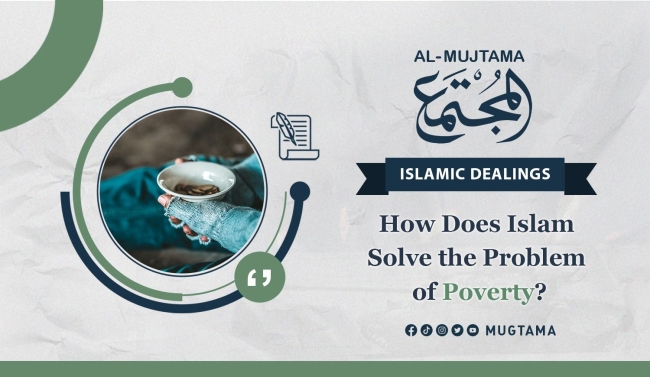How Does Islam Solve the Problem of Poverty? Featured
In today's world, poverty is an issue that affects millions of people globally. The gap between the rich and the poor continues to widen, leading to social unrest and an imbalanced society. Islam, as a comprehensive way of life, provides a framework for addressing and alleviating poverty. This article will delve into how Islam tackles the problem of poverty through various principles such as Zakat, the prevention and prohibition of usury, endowments, social solidarity, family ties, honoring parents, social responsibility of men towards women, and the responsibility of husbands for their wives.
Zakat: Empowering the Less Fortunate
One of the fundamental pillars of Islam is Zakat, which is an obligatory charity paid by Muslims. Zakat serves as a means of redistribution of wealth, ensuring that the needs of the less fortunate are met. It acts as a safety net for society's most vulnerable members, providing them with financial support, healthcare, education, and basic necessities. This system of wealth distribution plays a vital role in reducing poverty and bridging the gap between the rich and the poor.
Prevention and Prohibition of Usury: Fair Economic Practices
Islam prohibits usury, also known as interest, in all its forms. Usury often leads to the exploitation of the poor, trapping them in a cycle of debt and perpetuating their poverty. By prohibiting usury, Islam promotes fair economic practices that prevent individuals from falling into financial burdens. This prohibition fosters an environment where wealth is earned through ethical means, ensuring a more equitable distribution of resources and uplifting the disadvantaged.
Endowment: Sustaining Social Welfare
Another way Islam addresses poverty is through the concept of endowment (Waqf). The creation of endowments allows individuals to donate their wealth to a specific cause or organization, such as building schools, hospitals, or providing assistance to those in need. Endowments serve as a perpetual source of income, ensuring the sustainability of social welfare programs and initiatives. This continuous support helps alleviate poverty by providing ongoing assistance to those who require it.
Social Solidarity: Building Strong Communities
Islam emphasizes the importance of social solidarity and supporting one another during times of need. This principle fosters a sense of collective responsibility towards eradicating poverty. Muslims are encouraged to engage in acts of charity, volunteerism, and community service, creating a strong bond within the community and extending a helping hand to those in need. This commitment to social solidarity helps alleviate poverty by combining resources and efforts to uplift the less fortunate.
Family Ties: Obligations and Support
The institution of family holds great significance in Islam. It promotes strong family ties and emphasizes the responsibility of individuals towards their relatives, especially those facing poverty. Islam encourages providing financial, emotional, and social support to family members experiencing hardship. By prioritizing family welfare, Islam ensures a safety net for individuals who may be struggling economically, reducing the prevalence of poverty within families.
Honoring Parents: Caring for the Elderly
Islam places immense importance on honoring and caring for parents, especially in their old age. As individuals age, they may face financial challenges due to limited income or declining health. Islam emphasizes the duty of children to support and care for their parents, ensuring they have a dignified life free from poverty. This principle promotes intergenerational support and prevents the elderly from falling into poverty or neglect.
Social Responsibility of Men Towards Women
ISLAM recognizes the rights of women and emphasizes their empowerment. Men are entrusted with the responsibility of providing for their wives, ensuring their financial well-being, and meeting their needs. By emphasizing the social responsibility of men towards women, Islam aims to prevent women from facing economic hardships and reduce the prevalence of poverty among female-headed households.
Responsibility of Husbands for Their Wives
Islam places a significant responsibility on husbands to financially support their wives. This support includes providing for their basic needs, such as food, shelter, clothing, and medical care. By recognizing and enforcing this obligation, Islam aims to alleviate poverty among women by ensuring they have a stable and secure financial foundation.
In conclusion, Islam tackles the problem of poverty through various principles and practices. Zakat, the prevention and prohibition of usury, endowment, social solidarity, family ties, honoring parents, the social responsibility of men towards women, and the responsibility of husbands for their wives all contribute to a comprehensive approach to eradicating poverty. By implementing these principles, Islam strives to create a just and equitable society where poverty is minimized, and the welfare of all individuals is prioritized.


